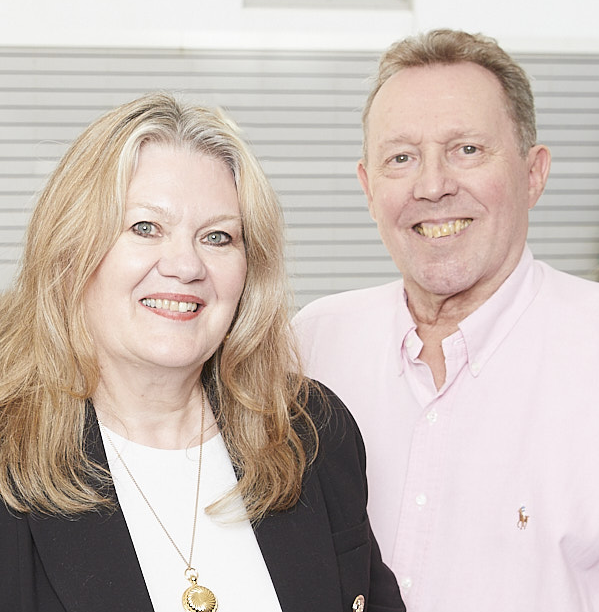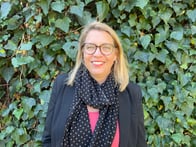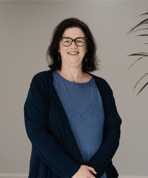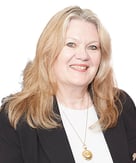Why almost everyone is wrong about the curriculum
Research shows children write better by hand but need keyboard skills too. Teaching both handwriting and typing enhances writing quality and supports...


Liane Moriarty’s latest offering, Here One Moment, is an interesting exploration of the fate versus free will debate. In what might have been a psychotic break, ‘the Death Lady’, as she becomes known, starts to predict the manner and age of the deaths of her fellow passengers onboard a domestic flight. Liane takes us on a journey with six of these passengers whose predictions are tragically imminent while concurrently delving into the Death Lady’s past to find out what makes her tick.
I always enjoy Moriarty’s use of multiple character perspectives, often seemingly unrelated, to cleverly weave together an unexpected story, and this book did not disappoint.
In another story with dual timelines, I listened to an audiobook version of
The Silence in Between by Josie Ferguson which follows the parallel stories of a mother and daughter in East Berlin during the Second World War and the rise of the Berlin Wall respectively (hardcopy available in Australia August 2025). I loved this story for its honest portrayal of humanity, both good and bad, under the harshest conditions.
It deals with the difficult themes of the trauma of war and separation from a female perspective. In her afterword, Ferguson details her research and the real stories behind the novel. Sadly, the most heart wrenching part, the separation of mother from her newborn son by the sudden dividing of east and west, is based on a news article describing a similar experience. I was interested to read that Ferguson studied clinical psychology, and this comes through in her exploration of differences in perception, something I find fascinating. She bestows a peculiar experience on a couple of her characters who perceive people’s music. This was Ferguson’s debut and I will certainly be looking out for more of her work in future.
Nicola Bell

The book I finished most recently is Reader, Come Home by Maryanne Wolf, which has been sitting patiently in my ‘unread’ pile since I bought it a few years ago. From the first page, it completely absorbed me. Wolf effectively weaves her own experiences as a reader with references to research on written language processing, using both as a basis for predicting how our general reading, writing and thinking habits will adapt (or maladapt) to the ever-more-present glut of attention-hungry digital technologies. In my life, I’ve failed to finish enough Man Booker Prize winners to know that I lack patience with books that are dense, meandering or unfamiliar – books written in a kind of ‘literary’ style that take effort and time to digest. I had always chalked that up to personal preference and my own unalterable limitations. Reader, Come Home has made me reconsider that conclusion. Maybe the it-paid-off-in-the-end genre of book is not so far out of reach. Maybe I just need to monitor my habits a bit and practise being patient.
Of course, the biggest factor influencing my reading practices in the last two years has been the presence of a new tiny person in the house. On the one hand, there’s a certain pleasurable intentionality of reading that goes alongside having only pockets of spare time during which the factor is napping. On the other hand, it’s difficult to find the capacity for deep reflection when, in another room, someone is alternately thumping their heels against the wall and yelling numbers (the preferred technique for self-soothing at the time of writing). Full immersion into literary fiction might be a few years away yet.
In the meantime, I have enjoyed some less effort-intensive books during recent months, like Agatha Christie’s Five Little Pigs and Lainie Anderson’s The Death of Dora Black. I also enjoyed a few audiobooks, including The Transgender Issue by Shon Faye and Unruly by David Mitchell. I remember thinking that both were excellent at the time of listening, although I couldn’t tell you anything about the latter except that England was once governed by a ‘King Cnut’. This speaks to a general difficulty I have with digesting content via audiobook when there’s no narrative structure to hook the words onto. It’s still good fun at the time of listening, but nothing sticks long-term. Perhaps that’s another of my own limitations I can blame on technology.
Gabrielle Brawn

This year I joined an online book club and I wanted to share two of my favourite reads so far. The first is Remarkably Bright Creatures by Shelby Van Pelt. As unlikely as it sounds, one of the main characters of this book is Marcellus, an intelligent giant Pacific octopus who is in captivity in an aquarium in a small town in America. Marcellus looks down on the inferiority of his captors but then develops an unlikely friendship with Tova, the night cleaner at the aquarium. The themes in this book include loneliness and being trapped by life circumstances and then making connections and finding hope. I found it to be such a delightful and uplifting story. The book club hosts recorded an interview with the author. Amazingly, this was her debut novel, and she described how Marcellus came out of an early exercise when she started a writing course. Her teacher recommended she write more about this character which was good advice as it has been a bestseller. She also shared that it is now being made into a movie with Sally Field to play Tova – I can’t wait!
The second book was Ciao Bella! Six Take Italy by Kate Langbroek, which I listened to as an audio book. This memoir is about their family’s decision to move from Melbourne to live in Bologna. It is full of humour as Kate recounts the challenges they faced – they didn’t speak Italian and didn’t know anyone living there. They had to find suitable schools for their four children and Kate had to make it work with her job as a radio co-host (in the days before remote working). Her vivid descriptions of the wonderful scenery and food in Italy made me want to rush out and book a trip! Their move was driven by their desire to seize life and spend more time with their children after their eldest son had undergone treatment for leukemia when he was younger. Their adventure was unfortunately interrupted when they found themselves caught up in the outbreak of the COVID-19 pandemic. Overall, it was a great reminder to live life to the full!
Mark Carter

I made a couple of rare forays into fiction in recent reading. I have been meaning to read behavioural psychologist B.F. Skinner’s fiction book Walden Two for ages and finally made the plunge. The book deals with Skinner’s idea of a utopian- planned society in America. Walden Two is described as a decentralised community with communal property and group childrearing. Given it was written in the late 1940s, I was surprised that Skinner did not find himself fronting the House Committee on Un-American Activities. I really wanted to like Skinner’s conception of a utopian society. Unfortunately, I didn’t. Perhaps I am just too individualistic and too old to change my ways. Mind you, to many present-day US citizens, any alternative may appear worth considering.
My second fiction read might be a bit of a stretch. Does Coffee Cause Cancer? by cardiologist and epidemiologist Christopher Lobos provides an approachable exploration of important principles related to research methods, statistics and epidemiology. The story is told through the fictional events surrounding a professional conference. Stay with me – it’s not as bad as it sounds. Lobos has a
keen eye for human nature and is an amusing writer. He even manages to incorporate two romances into the story, for those with interest in such matters. Lobos also effectively weaves in many key principles related to statistics and epidemiology. My high school maths teacher insisted that Pythagorean Theorem was important because it would be very useful in everyday life. I can honestly say I have never used Pythagorean Theorem, but I have used many of the principles enunciated by Lobos to identify and understand the seemingly endless misinformation, distortion and misinterpretation spewing from certain social media sites – you know the ones. Seems to me like exactly the sort of knowledge that should be compulsory for every student graduating high school.
Maddy Goto

A little late to the party, perhaps, but in the last six months I have discovered Percival Everett ... three books in, many more to go. While the themes across all three were consistent and serious, each book was spectacularly different and brilliantly put together. I was entertained on multiple levels and left with much to contemplate after each one.
Shortlisted for the 2024 Booker prize, James revisits Mark Twain’s Adventures of Huckleberry Finn, but offers a perspective of the story through the eyes and voice of Jim the escaped slave. Everett
cleverly uses code-switching, where James uses ‘slave vernacular’ to make the white people around him feel more comfortable, despite being able to covertly read and write and having intellectual imaginary conversations with various philosophers. The comedy of this role-playing sits within a fast-paced adventure story, and alongside the horrors and dehumanisation of chattel slavery. I reread the original Twain novel after this one, as I was curious to see how aligned they were. While the main events were the same, with both books focused on two runaways rafting down the Mississippi, the ending of James has an unexpected twist.
Next, I picked up The Trees. I am still in awe of how an author is able to create a page-turning narrative, exposing the thousands of brutal lynchings that took place from the late 1800s to the mid-1900s in the USA, yet achieve laugh-out-loud humour over and over again, not least from the names given to his characters: from Cad Fondle, the coroner, and Helvetica Quip, the medical examiner, to Wheat Bryant, a trucker from Money, Mississippi.
I didn’t love Erasure immediately but did by the end. This one was a trickier read, telling the story of Thelonius ‘Monk’ Elison, a writer who seeks to rectify the rejection of his work due to it not being “black enough”. This happens with Everett’s customary humour and satire, so cleverly positioned inside something deadly serious.
Suffice to say, Percival Everett has a new fan.
Alison Madelaine

Just recently, I reread 1984 by George Orwell. Even though I had read it before, I was still struck by how disturbing it remains, even in 2025. How did the author know we would have screens in our homes that listen to and monitor us? Fake news and AI-generated media content are other scary reminders of how relevant 1984 still is. And without wishing to get too political, it seems that the kind of unchecked power described in the novel is still an issue today.
In a similar, depressing vein, earlier in the year I devoured Juice by Tim Winton. After a catastrophic climate-related disaster, those living in certain parts of Australia must live underground during the summer due to extreme heat. The narrator moves between his present and past, describing his recruitment into a mysterious group targeting those they deem responsible for the environmental disaster. This is a chunky, doorstop of a book, but if you like dystopian stories and Tim Winton, I recommend it!
On to a more cheerful choice, I have always loved books told in diary entries or letters, so I really loved The Correspondent by Virginia Evans. The main character, Sybil Van Antwerp is retired, and after living a full life, she writes letters to various family members and others, including well-known authors (to let them know what she thinks of their books). This story is both funny and heartbreaking at the same time. I could not put it down.
Ying Sng

“Don’t hand this book out to just anyone!” my friend Lisa warned after I’d lent her The Vegetarian by Han Kang. The book is about a young South Korean woman who decides to become a vegetarian after recurring dreams of animals dying. Her decision causes great displeasure to her husband and family. Told in three parts through her husband, her brother- in-law and her sister, the whole book is a disturbing portrayal of a cry for help that not only falls on deaf ears but is met with brutal consequences.
Lisa is right. It’s not for the faint-hearted, but I thought it was provocative and worth reading.
John Boyne’s The Elements is a collection of four interconnected short stories: Water, Earth, Fire and Air. Published over 18 months, reading them felt like tuning in to watch weekly TV episodes rather than binging a whole season. Each book is from the perspective of an enabler, an accomplice, a perpetrator or a victim of abuse. Whilst Water and Air were enjoyable to read, Earth and Fire dealt with complex moral and emotional themes and explored challenging aspects of the human response to trauma. Although each story stands alone, reading the books in order reveals the connections between the characters and delivers a rather satisfying ending.
Finally, a book I have had to set aside unfinished. Whilst The Vegetarian left a lasting impression, the subject matter in Fang Si Chi’s First Love Paradise by Taiwanese author Lin Yi-Han asked more than I was ready to give. Knowing it drew from the author’s own experience, the story – centred on a schoolgirl’s ‘relationship’ with a revered teacher who is also her neighbour – was emotionally overwhelming. I may have to bury my copy in the backyard; Lisa would agree that this is not to be passed around lightly.
Kevin Wheldall

Is reader’s block a thing, like writer’s block? Who knows?
But I had it again for several months until it finally broke. I must have started at least three novels only to put them aside. Not that I had not been reading; I had of course been reading lots on screens, just not actual books. The books I discarded were not bad; the problem was me. (This may not have been unconnected to another bout of ill-health, leading to my being hospitalised and diagnosed with diabetes. Such is life.)
So, what stopped the rot or rather the drought? A new novel by the estimable Peter May, whose brilliant Chessmen trilogy (mentioned in an earlier issue) has now been extended to a fourth book, The Black Loch. It is a tour de force serving as both excellent novel in its own right while incorporating a startling “j’accuse” to the Scottish salmon farming industry. The images of farmed salmon half-eaten by sea lice, which are tiny crustaceans, will leave you unsettled about the prospect of ever eating farmed salmon again. I have no idea whether such a grim picture obtains in the Australian salmon industry but Booker Prize winner, Richard Flanagan’s book, Toxic: The Rotting Underbelly of the Tasmanian Salmon Industry suggests that it is little better.
I followed this up with a rather strange short story, published online, by Margaret Atwood and entitled My Evil Mother. It is about a woman whose mother believes herself to be a witch ... or perhaps she was. It was an odd read and quite disconcerting.
The Good Turn by Dervla McTiernan, which I also read online, was an amusing follow up to her previous crime novels; nothing special and it rang no particular bells. Imagine my consternation, then, when I came to add it to my BookBuddy file of books read. I had apparently already read it in 2020! This reminded me of a comment from an old friend of mine who remarked that there was very little need to buy any more books because he had hundreds already and could remember nothing about them. I know the feeling and here was the proof.
Finally, imagine if you were to read a book by Dickens in which David Copperfield met Oliver Twist or Austen’s Emma Woodhouse met Elizabeth Bennet... The many fans of Elizabeth Strout will be delighted with her latest novel, Tell Me Everything, in which two of her characters from two, until now, separate series of books, do just that. The irascible Olive Kitteridge meets that gentle soul, Lucy Barton, and they gossip and swap stories. And that’s really all there is to it but, in the hands of such a fine writer, one is drawn into their rather prosaic world and spends a delightful time in their company.
Robyn Wheldall

My reading life of late has had a common theme; the way in which individuals deal with their mortality, or that of those close to them, and who can tell the stories of those who have died. A rather morbid preoccupation you might think, but when one’s husband has a chronic and incurable cancer it does tend to focus the mind. I was very interested to read Peter Goldsworthy’s The Cancer Finishing School. I was aware of Goldsworthy as a medical doctor and an Australian author and columnist but had never read any of his fiction. Not that The Cancer Finishing School is a work of fiction. Rather, it an autobiographical account of Goldsworthy’s own journey with the blood cancer, myeloma. As this is the same cancer that has been a part of my life for nearly 16 years, I related to his description of his and his loved ones’ response to the diagnosis and the treatment – including an autologous stem-cell transplant which is always scary because the chance of not surviving this treatment is a real threat. There were so many resonances for me that one would think that this made the book appealing. Not so. I found Goldsworthy’s tone rather glib, but the real exception I took was the way in which he described his own patients and some of their journeys. I found this invasive and rather betraying of their trust which I thought, as a medical doctor, he would understand.
This brings me to Anne Patchett’s well-known work Truth and Beauty: A Friendship. This book was published in 2004 and is considered to have added considerable momentum to Patchett’s developing career as an author of note. Disconcerting then, that so many of the details of her close friendship with her recently deceased friend, Lucy Grealy, and the details of her troubled life were disclosed. So distressed were Grealy’s family that they had tried to stop the publication but failed.
It is a compelling memoir (and I am a great fan of Ann Patchett’s writing) but I could not help thinking, ‘what would your friend think of this if she were alive’? Does being a writer give one permission to share intimate secrets and knowledge of one’s friends? This had troubled me about Goldsworthy’s book as well, when he described his own patients so well in his book that they recognised themselves! Who gets to tell other people’s stories?
My faith in the possibility of good coming from a writer telling other people’s stories was restored when I read A Better Death: Conversations About the Art of Living and Dying Well by Dr Ranjana Srivastava, an oncologist, award-winning writer, broadcaster and Fulbright scholar. Writing of her own experience and conversations with her patients, this book was a very sensitive treatment of people’s journeys towards their deaths. This was done respectfully and instructively. It was not morbid but inspiring in the way it gently opened the necessity for us all to think of our own mortality and how we need to live our lives with this in mind. Srivastava’s message is that our modern experience of death and dying has been overly medicalised and hidden away from our everyday experience. We often try to block out thoughts of our own mortality with the confidence in the magnificent advances that have been made in medical science. As grateful as we are for these, this does not take away from the fact that there are the two great certainties of life: birth and death. Srivastava skilfully provides advice on leading a meaningful life and finding dignity and composure at its end. It is a book that should be widely read and re-read.
This article appeared in the Sept 2025 edition of Nomanis.
Research shows children write better by hand but need keyboard skills too. Teaching both handwriting and typing enhances writing quality and supports...
Research shows children write better by hand but need keyboard skills too. Teaching both handwriting and typing enhances writing quality and supports...
Research shows children write better by hand but need keyboard skills too. Teaching both handwriting and typing enhances writing quality and supports...